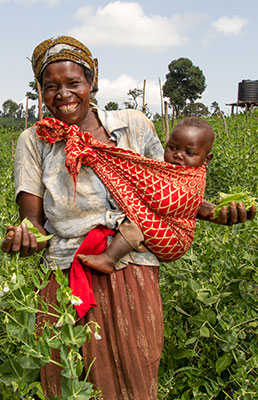Unlike the UK, drought in Africa doesn’t just hit crop yields, it impacts on life itself. But UK and African farmers are both grappling with ways to manage water more wisely – there just happens to be a lot less of it in Africa.
With families often having less than one hectare, anything that undermines yields means an empty stomach.
Along with encouraging the use of disease-resistant crop seeds, smallscale irrigation is just one of the technologies that Farm Africa works with to help farmers cope with drought.
Capturing rainwater is a critical element of dealing with drought and ‘zai’ pits and ridges are dug to make the most of this precious resource.
Drought-tolerant crops grown from seeds supplied by Farm Africa have doubled yields of sorghum, millet and cowpeas in Kitui, Kenya.
Maintaining healthy soils is also crucial the world over. In the UK, big machinery creates soil management and structural challenges.
‘One tractor here is the size of a whole farm at home!’ says Mr Kadenge.
Understanding how to improve, and maintain, soil health is the focus of his farming in Kenya.
‘Soil testing and knowing about soil health is very important.’ He believes affordable, portable soil testing kits would help to transform yields.
‘At the moment, tests cost £8-£9, which is very expensive for farmers earning £1/day.



